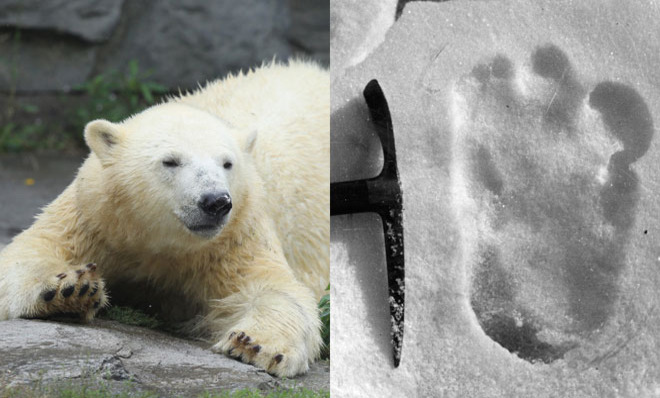The legendary yeti might actually be a bear
DNA samples analyzed by Oxford geneticists suggest the abominable snowman isn't a man at all

A free daily email with the biggest news stories of the day – and the best features from TheWeek.com
You are now subscribed
Your newsletter sign-up was successful
Myths are just stories we want to believe are true. Many would be displeased, for example, to learn that the Loch Ness monster is in actuality a Hollywood fabrication. The same is likely true for Bruce and Kris Jenner's crumbling marriage as Keeping Up's ratings continue to slide. But new research from respected geneticists at Oxford University makes a compelling case that at least one tall tale may be at least somewhat grounded in reality: The legendary and fearsome yeti could be a real living creature after all.
Only the DNA findings suggest the abominable snowman is probably not a half-human, half-ape monster; it's a bear.
A bear! More specifically, a bear with DNA very similar to an ancient arctic-roaming bear long thought to be extinct. Professor Bryan Sykes of Oxford University put out a call last year for tissue samples and hair samples purported to be from the yeti.
The Week
Escape your echo chamber. Get the facts behind the news, plus analysis from multiple perspectives.

Sign up for The Week's Free Newsletters
From our morning news briefing to a weekly Good News Newsletter, get the best of The Week delivered directly to your inbox.
From our morning news briefing to a weekly Good News Newsletter, get the best of The Week delivered directly to your inbox.
Sykes and his team received two interesting specimens: Hairs taken from a "yeti mummy" left frozen in the northern Indian region of Ladakh (the samples were collected 40 years ago by a French mountaineer, but the corpse was never hauled back down for research), and a single hair found 800 miles east and a decade ago in Bhutan.
The geneticists then compared the results to thousands of creatures — some living, some extinct — from a sprawling database of every sequenced DNA strand available. National Geographic reports that the yeti specimens' DNA samples matched "the genetic signature of a polar bear jawbone that was found in the Norwegian Arctic in 2004" to the tune of 100 percent.
Scientists speculate the jawbone, thought to be in the ballpark of 120,000 years old, is from a creature bridging the gap between a brown bear and its Coca-Cola-drinking white cousin.
One big caveat, though: The animal might not even be alive anymore.
A free daily email with the biggest news stories of the day – and the best features from TheWeek.com
"I think this bear, which nobody has seen alive...may still be there and may have quite a lot of polar bear in it," Sykes tells BBC News. "It may be some sort of hybrid and if its behavior is different from normal bears, which is what eyewitnesses report, then I think that may well be the source of the mystery and the source of the legend."
Contrary to the widely held view that the yeti is a white, shaggy creature that skulks around the mountains roaring and stuff, descending from a brown bear jibes with Himalayan cultural lore, which paints the yeti as either brown or reddish-brown.
Still, there are a lot of big questions and what-ifs that will need to be answered soon, namely, What if the initial samples weren't considered yetis after all? Critics are calling for Sykes to publish his findings in a peer reviewed journal, which he promises will happen soon enough.
Nevertheless it's a striking thesis that could help quell a few centuries worth of persisting curiosity. "The next thing," Sykes tells the Associated Press, "is [to] go there and find one."
The findings will be detailed in a new BBC documentary series called Bigfoot Files, which premieres in the U.S. on Nov. 7.